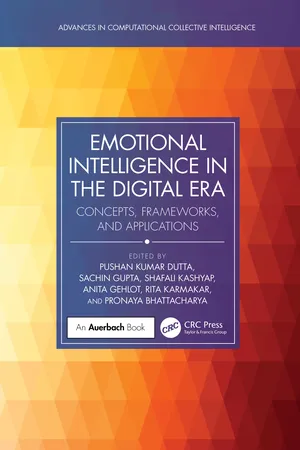
Emotional Intelligence in the Digital Era
Concepts, Frameworks, and Applications
- 472 pages
- English
- ePUB (mobile friendly)
- Available on iOS & Android
Emotional Intelligence in the Digital Era
Concepts, Frameworks, and Applications
About this book
With research perspectives on elements of psychology and technology, Emotional Intelligence in the Digital Era: Concepts, Frameworks, and Applications provides insight into the intersection of emotional intelligence and digital technologies, including artificial intelligence (AI). It explains how technology has the potential to enhance emotional intelligence and promote positive psychological outcomes. It also discusses the role of technology in facilitating social connections that support mental health and promote self-reflection and personal growth.
The main themes explored in the book revolve around understanding human psychology in the context of digital technology in the post-pandemic environment. The book delves into how emotional intelligence plays a crucial role in adapting to virtual environments. It also examines how AI and other digital technologies can enhance engagement and effectiveness. Emphasizing the need for a balanced approach to integrating technology in the field of psychology, the book highlights the potential benefits of technology in promoting emotional intelligence and positive psychological outcomes while also acknowledging the potential risks and ethical considerations associated with its use.
Covering such aspects of human psychology as cognitive and emotional processing, personality, motivation, and decision-making, the book discusses the role of technology in improving human psychological perspectives and emotional intelligence, especially within a post-pandemic context. It also examines the use of virtual reality, teletherapy, and other digital tools in mental health interventions. Written for researchers, academics, and mental health professionals, the book is a deep dive into research investigating human psychology, emotional intelligence, and technology.
Frequently asked questions
- Essential is ideal for learners and professionals who enjoy exploring a wide range of subjects. Access the Essential Library with 800,000+ trusted titles and best-sellers across business, personal growth, and the humanities. Includes unlimited reading time and Standard Read Aloud voice.
- Complete: Perfect for advanced learners and researchers needing full, unrestricted access. Unlock 1.4M+ books across hundreds of subjects, including academic and specialized titles. The Complete Plan also includes advanced features like Premium Read Aloud and Research Assistant.
Please note we cannot support devices running on iOS 13 and Android 7 or earlier. Learn more about using the app.
Information
Table of contents
- Cover
- Half Title
- Series
- Title
- Copyright
- Contents
- List of Contributors
- Chapter 1 Emotional Intelligence in the Age of Digital Intelligence
- Chapter 2 Exploring the Role of Emotional Intelligence in Fostering Innovation
- Chapter 3 Simulating Mental-Emotional Intelligence through Interactive Virtual-Augmented Reality Modules: Enhancing Virtual Training and Stress Reduction Techniques for Improved Mental Health—Mindfulness in Regulating Emotions
- Chapter 4 A Model for Understanding Emotion in Online Learning Using Fuzzy Logic
- Chapter 5 A Bibliometric Evaluation of the Link between Emotional Intelligence and Innovation
- Chapter 6 Emotional Intelligence: The Catalyst for Innovation in the Modern Era
- Chapter 7 The Role of Emotional Intelligence in Career Development and Career Success
- Chapter 8 The Crucial Role of Emotional Intelligence and Mental Health in Crisis Management: A Comprehensive Analysis
- Chapter 9 Pedagogical Practices of Innovation in Teachers’ Emotional Intelligence and Well-Being
- Chapter 10 Navigating Success: The Intersection of Emotional Intelligence and Career Development
- Chapter 11 Emotional Resilience in Times of Crisis: Leveraging Emotional Intelligence for Effective Response
- Chapter 12 Examining the Emotional Well-Being of MBA Students in the Context of the COVID-19 Pandemic Lockdown
- Chapter 13 Enhancing Environmental Sensitivity through Emotional Intelligence: The Role of Virtual Reality Training in Ecopsychological Education among Individuals with Disability
- Chapter 14 The Relationship between Emotional Intelligence, Transformational Leadership, and Organizational Culture
- Chapter 15 Embracing Emotional Intelligence in Digital Workspaces: A Qualitative Case Study of Organizational Culture Dynamics
- Chapter 16 Digital Empathy: Assessing the Impact of Virtual Training Programs on Emotional Intelligence and Mental Health through Media and Communication
- Chapter 17 Addressing Digital Distraction at Work: A Systematic Literature Review
- Chapter 18 Digital Deluge: Navigating the Impact of Emotional Intelligence in the New-Age Workplace
- Chapter 19 Meditation in Education: Nurturing Mindfulness for Student Success
- Chapter 20 The Synergy of Emotional Intelligence, Mental Health, and Physical Fitness: The Impact of Yoga on Daily Life
- Chapter 21 Emotional Intelligence as Key Determinant of Job Performance and Job Satisfaction: A Multifaceted Analysis across Diverse Occupational Settings
- Chapter 22 Resilience and Response: The Crucial Role of Emotional Intelligence in Disaster Response
- Chapter 23 A Bibliometric Review Study of Emotional Intelligence and Innovation: Addressing the Challenges of a Post-Pandemic Economy
- Chapter 24 A Study on the Impact of Depression among Upcoming Talents in the Entertainment Industry
- Chapter 25 The Role of Emotional Intelligence in Fostering Innovation in the Indian Banking Industry
- Chapter 26 The Role of Electronic HRM in Enhancing Emotional Intelligence and Shaping Organizational Culture: A Comprehensive Review and Future Research Framework
- Chapter 27 Investigating the Impact of Knowledge Management, Job Stress, and Emotional Intelligence on Innovative Performance in Apparel Workers
- Index